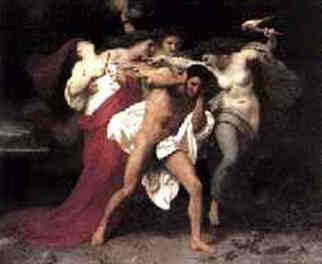WHAT ARE THE THREE TRAITORS INSIDE US?
Topic of the Week -- Previous Topics
Answers from the books of Samael Aun Weor

In deep inner work, within the field of strict psychological auto-observation, we have to directly experience all the cosmic drama. The Intimate Christ has to eliminate all the undesirable elements which we carry within ourselves.
In our psychological depths, the multiple psychic aggregates yell asking for the crucifixion of the inner lord.
Unquestionably, each of us carries the three traitors in his psyche.
Judas, the demon of desire; Pilate, the demon of the mind; Caiaphas, the demon of ill will.
These three traitors crucify the Lord of Perfections, in the very depths of our soul. They are three specific types of fundamental inhuman elements in the cosmic drama.
Undoubtedly, this cited drama has always been secretly lived in the depths of the superlative consciousness of the Being. The cosmic drama is not the exclusive property of the Great Kabir Jesus, as learned ignoramuses always suppose.
The initiates of all times, the Masters in all centuries have had to live the cosmic drama within themselves, here and now.
However, Jesus the Great Kabir had the courage to perform such intimate drama publicly, in the street and in broad daylight, in order to open for all human beings the sense of initiation, without distinction of race, sex, caste or color. It is marvelous that there is somebody who publicly taught all the peoples of the earth the intimate drama.
The Intimate Christ, though is not lustful, has to eliminate from himself the psychological elements of lust.
The Intimate Christ, though in himself is peace and love, must eliminate from himself the undesirable elements of anger.
The Intimate Christ, not being covetous, has to eliminate from himself the undesirable elements of covetousness.
Though not being envious, the Intimate Christ has to eliminate from himself the psychic aggregates of envy.
The Intimate Christ, though he is perfect humility, infinite modesty, absolute simplicity, must eliminate from himself the sickening elements of pride, of vanity, of conceit.
The Intimate Christ, the word, the Creating Logos, always living in constant activity has to eliminate in our interior, in himself and by himself, the undesirable elements of inertia, of laziness, of stagnation. The Lord of Perfection, though being used to all the fastings, temperate, never a friend of drunkenness and great banqueting, has to eliminate from himself the abominable elements of gluttony.
A strange symbiosis is that of the Christ-Jesus; Christ-Man; a rare mixture of the divine and the human, of the perfect and the imperfect; an always constant test for the Logos.
Most interesting of all is that the secret Christ is always a triumpher; somebody who constantly defeats darkness; somebody who eliminates darkness within himself, here and now. The Secret Christ is the Lord of the Great Rebellion, rejected by the priests, by the elders and by the scribes of the temple.
Priests hate him; that is to say, they do not comprehend him, they want the Lord of Perfections to exclusively live in time in accordance with their unbreakable dogmas.
The elders, that is to say, the dwellers on this earth, the good householders, the judicious people, the people with experience, abhor the Logos, the Red Christ, the Christ of the Great Rebellion, because he goes out of the world, out of their habits and antiquated, reactionary customs petrified in many yesterdays.
The scribes of the temple, the rogues of intellect, abhor the Intimate Christ because he is the antithesis of the Antichrist; he is a declared enemy of all that compost heap of university theories which are so abundant in the markets of bodies and souls.
The three traitors mortally hate the Secret Christ and convey him to death within ourselves and in our own psychological space.
Judas, the demon of desire, always changes the lord for thirty coins of silver, that is to say, for liquor, money, fame, vanities, fornication, adultery, etc.
Pilate, the demon of the mind, always washes his hands, always declares himself innocent, is never to blame, constantly justifies himself to himself and to others, he seeks excuses, means of evading his own responsibilities, etc.
Caiaphas, the demon of ill will, unceasingly betrays the Lord within ourselves; the adorable Intimate one gives him the staff for him to lead his sheep to pasture, however, the cynical traitor turns the altar into a bed of pleasures, unceasingly fornicates, commits adultery, sells the sacraments, etc.
These three traitors make the adorable Intimate lord suffer secretly without any compassion whatsoever.
Pilate has the crown of thorns put on his brow, the evil "I"s lash him, insult him, curse him in the intimate psychological space without any kind of mercy.
